8 Best WordPress Alternatives
WordPress is undoubtedly one of the most popular content management systems (CMS) in the world, powering over 40% of all websites on the internet. It offers many features and flexibility, making it a go-to choice for many individuals and businesses. However, despite its popularity, WordPress may not be the best fit for everyone. It has limitations, and exploring other options can be beneficial in finding a platform that better suits your needs.
One of WordPress’s main limitations is its complexity. While it offers many customization options, it can be overwhelming for beginners or those without technical expertise. Additionally, WordPress requires regular updates and maintenance to ensure security and optimal performance, which can be time-consuming for some users. Furthermore, as WordPress is an open-source platform, it can be susceptible to security vulnerabilities if not properly managed.
Considering alternatives to WordPress is essential because it allows you to explore different platforms that may offer features and benefits that better align with your specific requirements. Whether you’re looking for an all-in-one website builder, a minimalist blogging platform, or an enterprise-grade CMS, numerous options can provide a more tailored solution for your website needs.
| CMS | Name | Rating | Link |
|---|---|---|---|
 | 9 | Visit Wix.com | |
 | 9 | Visit Squarespace | |
 | 9 | Visit Shopify |
1. Wix: The All-in-One Website Builder
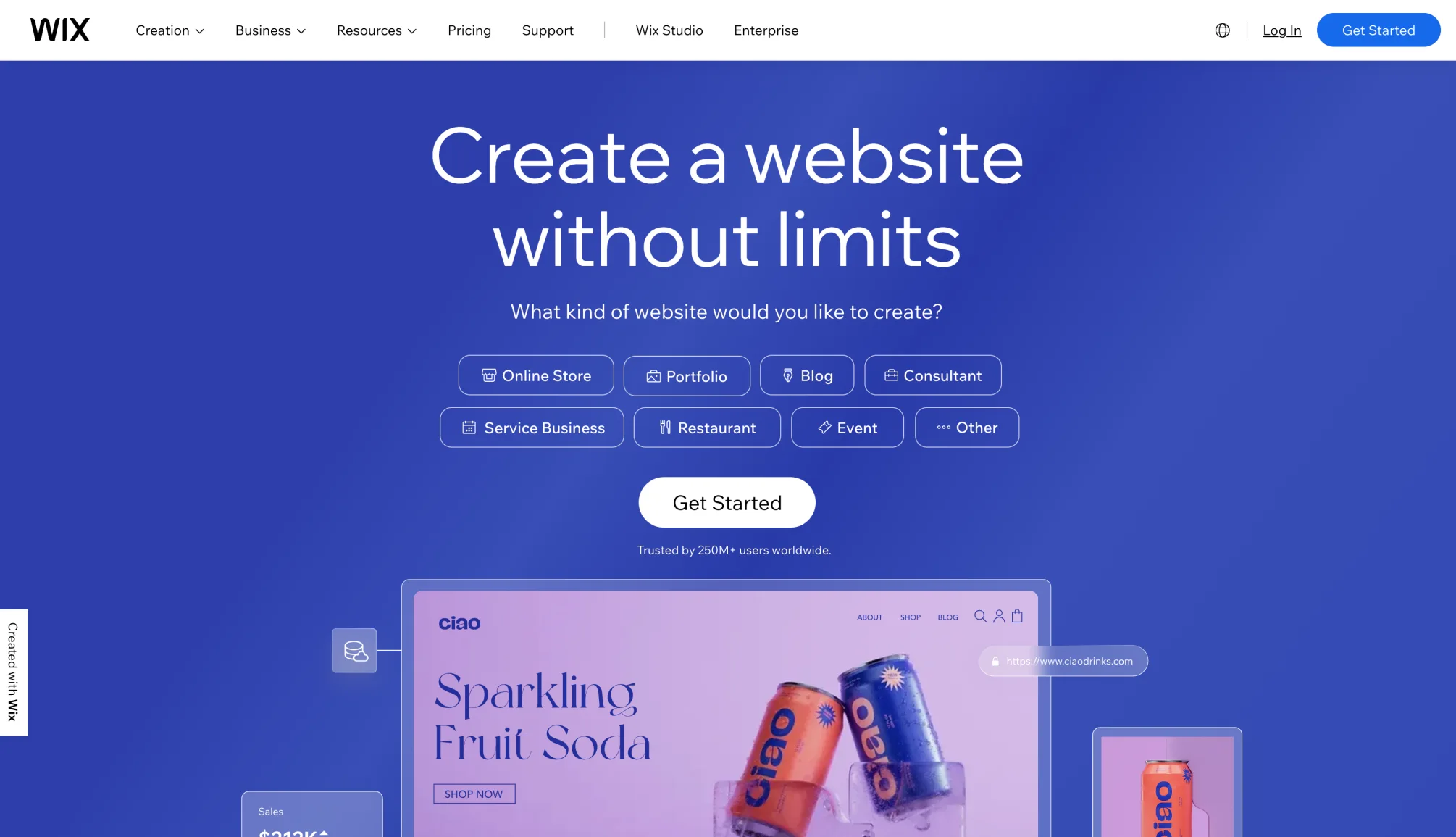
Wix is a famous website builder offering an all-in-one solution for creating professional-looking websites without coding knowledge. It provides a drag-and-drop interface, allowing users to customize their websites quickly with various design elements and features. Wix also offers many templates, making creating a visually appealing website easy.
One critical benefit of Wix is its user-friendly interface. It is designed with beginners in mind, allowing anyone to create a website quickly and easily. Wix also offers various features, such as SEO tools, e-commerce capabilities, and mobile optimization, making it suitable for various website types.
Wix offers several pricing plans to cater to different needs and budgets. The basic plan is free, but it has limitations, such as Wix branding on your website and limited storage and bandwidth. Paid plans start at $14 monthly and offer additional features such as a custom domain, more storage, and advanced analytics.
Some examples of websites built with Wix include small business websites, portfolios, and online stores. Wix showcases these websites on their platform, allowing users to see the possibilities and get inspiration for their projects.
2. Squarespace: The Designer’s Choice

Squarespace is popular among designers and creatives due to its sleek and modern templates. It offers a range of professionally designed templates that are highly customizable, allowing users to create visually stunning websites without any coding knowledge.
One of Squarespace’s standout features is its focus on design. The templates are designed aesthetically, making creating a visually appealing website easy. Squarespace also offers a variety of design tools, such as image editing, custom CSS, and typography options, giving users complete control over the look and feel of their website.
Squarespace offers different pricing plans to suit different needs. The plans start at $12 per month for a personal website and go up to $40 per month for an advanced e-commerce website. All plans include hosting, SSL security, and 24/7 customer support.
Portfolios, blogs, and online stores are examples of websites built with Squarespace. Squarespace showcases these websites on its platform, allowing users to see the possibilities and get inspiration for their projects.
3. Shopify: The E-commerce Powerhouse

Shopify is a leading e-commerce platform that allows users to create online stores and sell products or services. It offers a range of features specifically tailored for e-commerce, making it a powerful choice for businesses looking to establish an online presence.
One of Shopify’s key benefits is its ease of use. It provides a user-friendly interface that allows users to set up their online store quickly and easily. Shopify also offers a wide range of themes and templates designed specifically for e-commerce, making creating a visually appealing and functional online store easy.
Shopify offers different pricing plans to cater to different business sizes and needs. The plans start at $29 monthly for basic features and go up to $299 for advanced features such as advanced reporting and international selling capabilities. Shopify also offers a Lite plan for $9 per month, which allows users to add a buy button to an existing website or blog.
Small businesses, large enterprises, and niche e-commerce stores are examples of websites built with Shopify. Shopify showcases these websites on its platform, allowing users to see the possibilities and get inspiration for their online stores.
4. Ghost: The Minimalist Blogging Platform
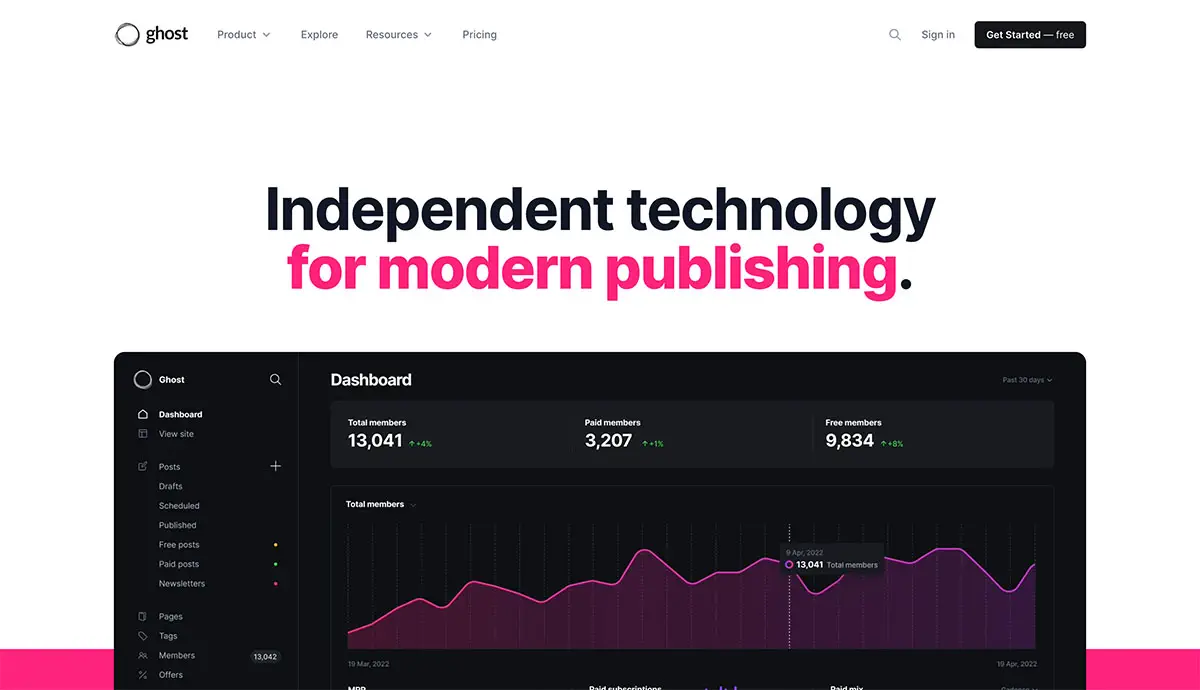
Ghost is a minimalist blogging platform that focuses on simplicity and speed. It offers a clean and intuitive interface that lets users focus on writing and publishing content without distractions.
One of Ghost’s critical features is its focus on blogging. It provides tools specifically designed for bloggers, such as markdown support, content scheduling, and SEO optimization. Ghost also offers a variety of themes and templates that are optimized for readability and mobile responsiveness.
Ghost offers different pricing plans to cater to different needs. The plans start at $29 per month for basic features and go up to $199 per month for advanced features such as priority support and custom domains. Ghost also offers a self-hosted option for those who prefer more control over their website.
Websites built with Ghost include personal blogs, online magazines, and news websites. Ghost showcases these websites on their platform, allowing users to see the possibilities and get inspiration for their blogs.
5. Joomla: The Open-Source CMS
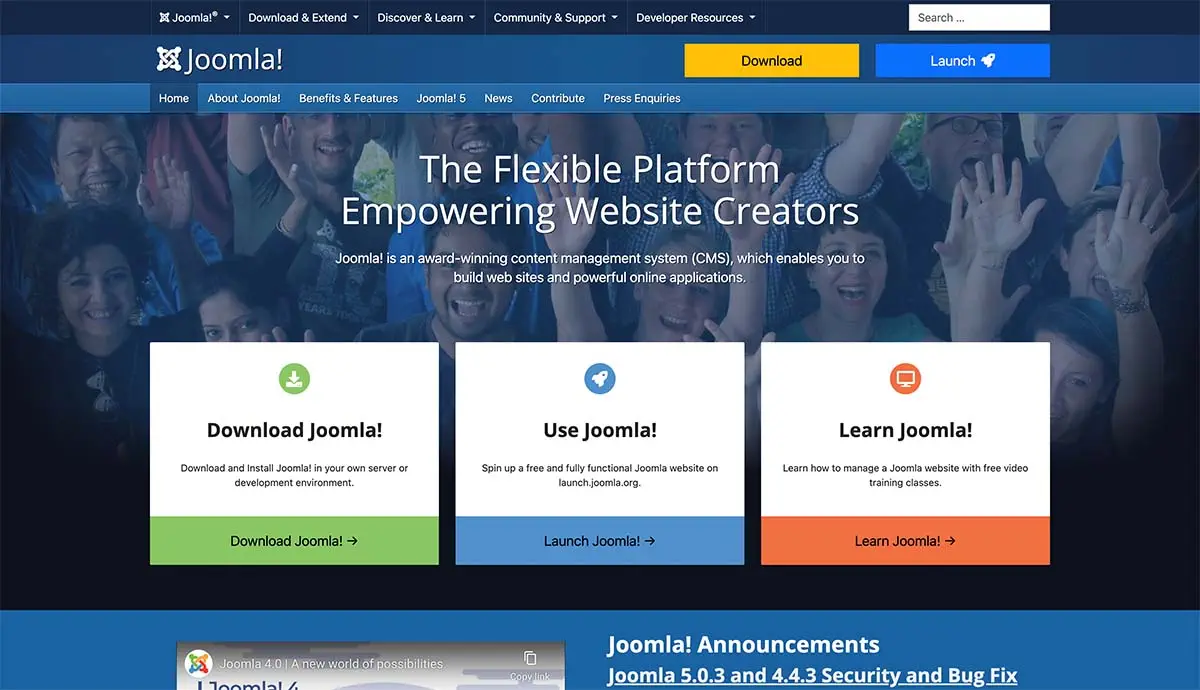
Joomla is an open-source content management system that offers a wide range of features and flexibility. It is known for its robustness and scalability, making it a popular choice for large and complex websites.
One of the key features of Joomla is its extensibility. It offers a vast library of extensions and plugins, allowing users to add functionality to their websites. Joomla also provides a range of templates and themes that can be customized to create a unique website design.
Joomla is free, but users must purchase a domain name and hosting. Premium templates and extensions, which enhance the functionality and design of your Joomla website, are also available for purchase.
Examples of websites built with Joomla include corporate websites, online communities, and e-learning platforms. Joomla showcases these websites on their platform, allowing users to see the possibilities and get inspiration for their projects.
6. Drupal: The Enterprise-Grade CMS
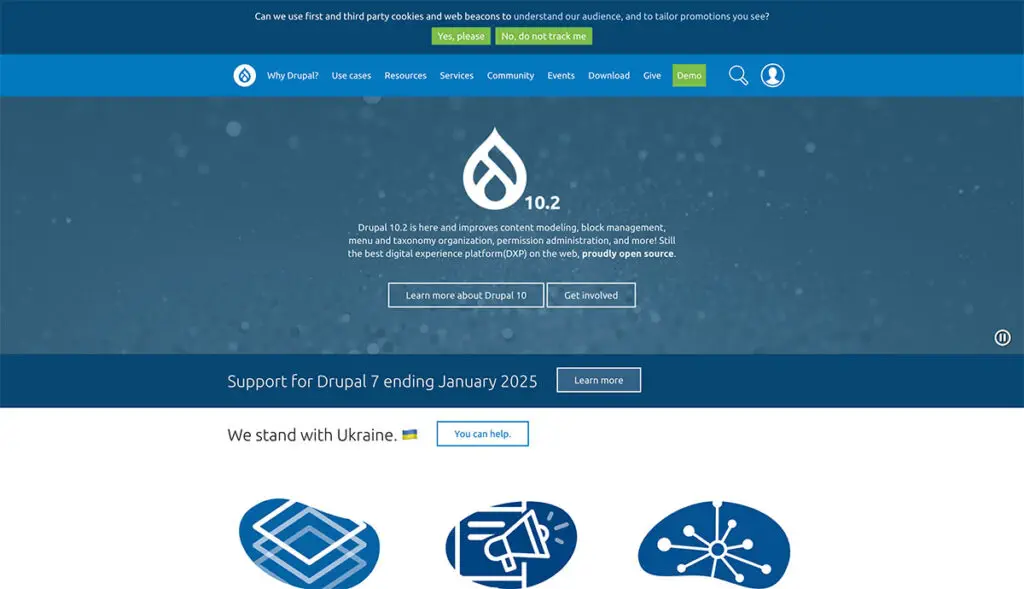
Drupal is an enterprise-grade content management system that offers advanced features and scalability. It is known for its security, flexibility, and ability to handle large amounts of content.
One of the key features of Drupal is its flexibility. It offers a highly customizable framework that allows users to create complex websites with specific requirements. Drupal also provides a range of modules and themes that can enhance your website’s functionality and design.
Drupal is free, but users must purchase a domain name and hosting. Premium themes and modules, which enhance the functionality and design of your Drupal website, are also available for purchase.
Examples of websites built with Drupal include government websites, educational institutions, and large-scale e-commerce platforms. Drupal showcases these websites on their platform, allowing users to see the possibilities and get inspiration for their projects.
7. Weebly: The Beginner-Friendly Website Builder
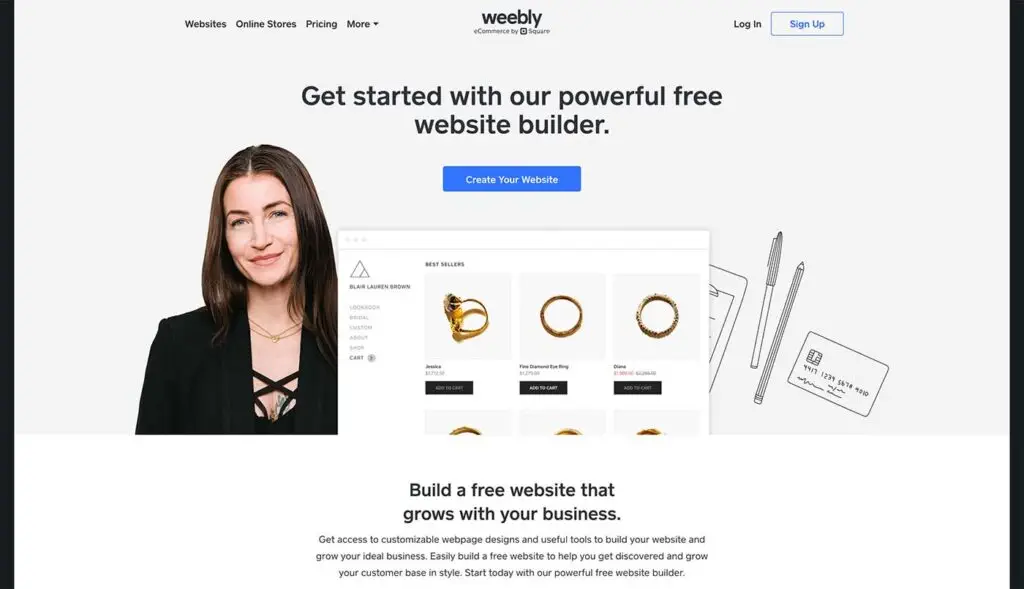
Weebly is a beginner-friendly website builder that offers a simple and intuitive interface. It provides a drag-and-drop editor that allows users to customize their websites easily without coding knowledge.
One of the key benefits of Weebly is its ease of use. It is designed with beginners in mind, allowing anyone to create a website quickly and easily. Weebly also offers a range of features such as e-commerce capabilities, SEO tools, and mobile optimization, making it suitable for a wide range of website types.
Weebly offers several pricing plans to cater to different needs and budgets. The basic plan is free but has limitations, such as Weebly branding on your website and limited storage and bandwidth. Paid plans start at $6 monthly and offer additional features such as a custom domain, more storage, and advanced analytics.
Examples of websites built with Weebly include small business websites, portfolios, and personal blogs. Weebly showcases these websites on their platform, allowing users to see the possibilities and get inspiration for their projects.
8. Webflow: The Visual CMS for Designers
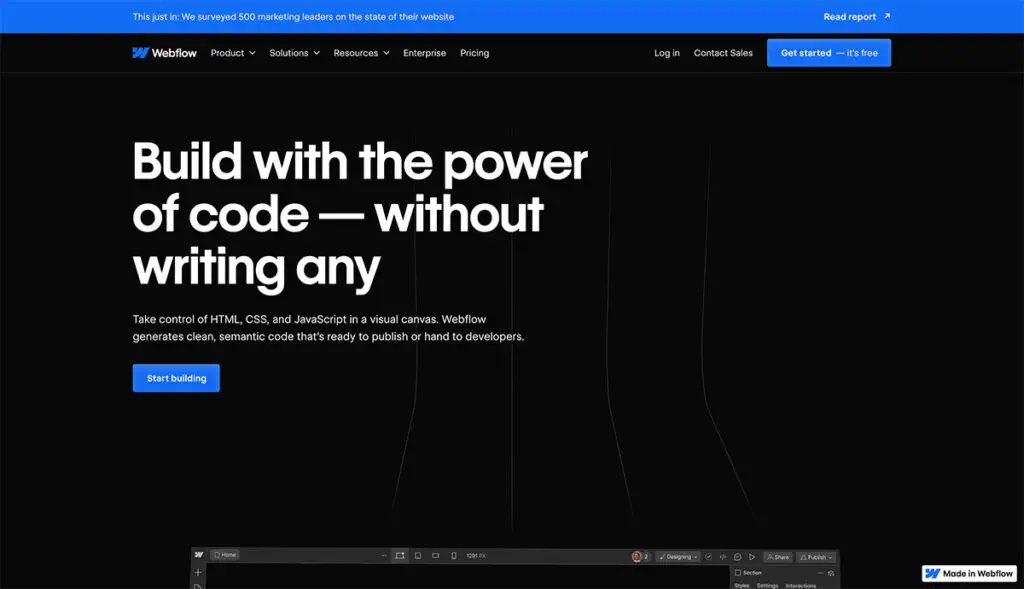
Webflow is a visual content management system that offers advanced design capabilities. It provides a visual editor, allowing users to design and customize their websites visually without coding knowledge.
One of Webflow’s standout features is its design capabilities. It offers a range of design tools, such as CSS grid, flexbox, and animations, allowing users to create visually stunning websites. Webflow also provides a variety of templates and themes that can be customized to create a unique website design.
Webflow offers different pricing plans to cater to different needs. The plans start at $12 monthly for basic features and go up to $36 for advanced features such as e-commerce capabilities and client billing. Webflow also offers an enterprise plan for larger businesses with specific requirements.
Examples of websites built with Webflow include portfolios, agency websites, and e-commerce stores. Webflow showcases these websites on their platform, allowing users to see the possibilities and get inspiration for their projects.
Choosing the Right WordPress Alternative for Your Needs
In conclusion, exploring WordPress alternatives can help you find a platform that better suits your specific needs. Whether you’re looking for an all-in-one website builder, a minimalist blogging platform, or an enterprise-grade CMS, numerous options can provide a more tailored solution for your website needs.
When choosing a WordPress alternative, consider factors such as ease of use, design capabilities, scalability, and pricing. Each platform has strengths and weaknesses, so evaluate your requirements and choose the one that best aligns with your goals.
The suitable WordPress alternative will ultimately depend on your specific needs and preferences. Whether you’re a beginner looking for a user-friendly website builder or an enterprise looking for a robust CMS, a platform can meet your requirements. You can find the perfect platform to create your dream website by exploring different options and considering the abovementioned factors.
FAQs
What is WordPress?
WordPress is a popular content management system (CMS) that allows users to create and manage websites without knowing how to code.
Why would someone want to use an alternative to WordPress?
While WordPress is a great CMS, it may not suit everyone. Some may prefer a more straightforward or specialized platform, while others want more control over their website’s design and functionality.
What are some of the best WordPress alternatives?
The best WordPress alternatives include Wix, Squarespace, Shopify, Weebly, Ghost, Joomla, Drupal, Magento, Blogger, and Tumblr.
What are the main differences between WordPress and its alternatives?
The main differences between WordPress and its alternatives include ease of use, customization options, pricing, and the types of websites they are best suited for.
Are WordPress alternatives suitable for all types of websites?
No, not all WordPress alternatives are suitable for all types of websites. Some platforms are better suited for e-commerce sites, while others are better for blogs or portfolios.
Do WordPress alternatives require coding knowledge?
Most WordPress alternatives do not require coding knowledge, as they offer drag-and-drop interfaces and pre-designed templates. However, some platforms may offer more advanced customization options that require coding knowledge.
Are WordPress alternatives more or less expensive than WordPress?
The cost of WordPress alternatives varies depending on the platform and the features you need. Some platforms may be more expensive than WordPress, while others may be less expensive.
Can I migrate my WordPress site to an alternative platform?
It is possible to migrate your WordPress site to an alternative platform. However, the process may vary depending on the platform you choose and the complexity of your website.
Do WordPress alternatives offer plugins and themes like WordPress?
Most WordPress alternatives offer plugins and themes, although the selection may be more limited than what is available for WordPress. Some platforms may also offer their proprietary plugins and themes.







No Comment! Be the first one.